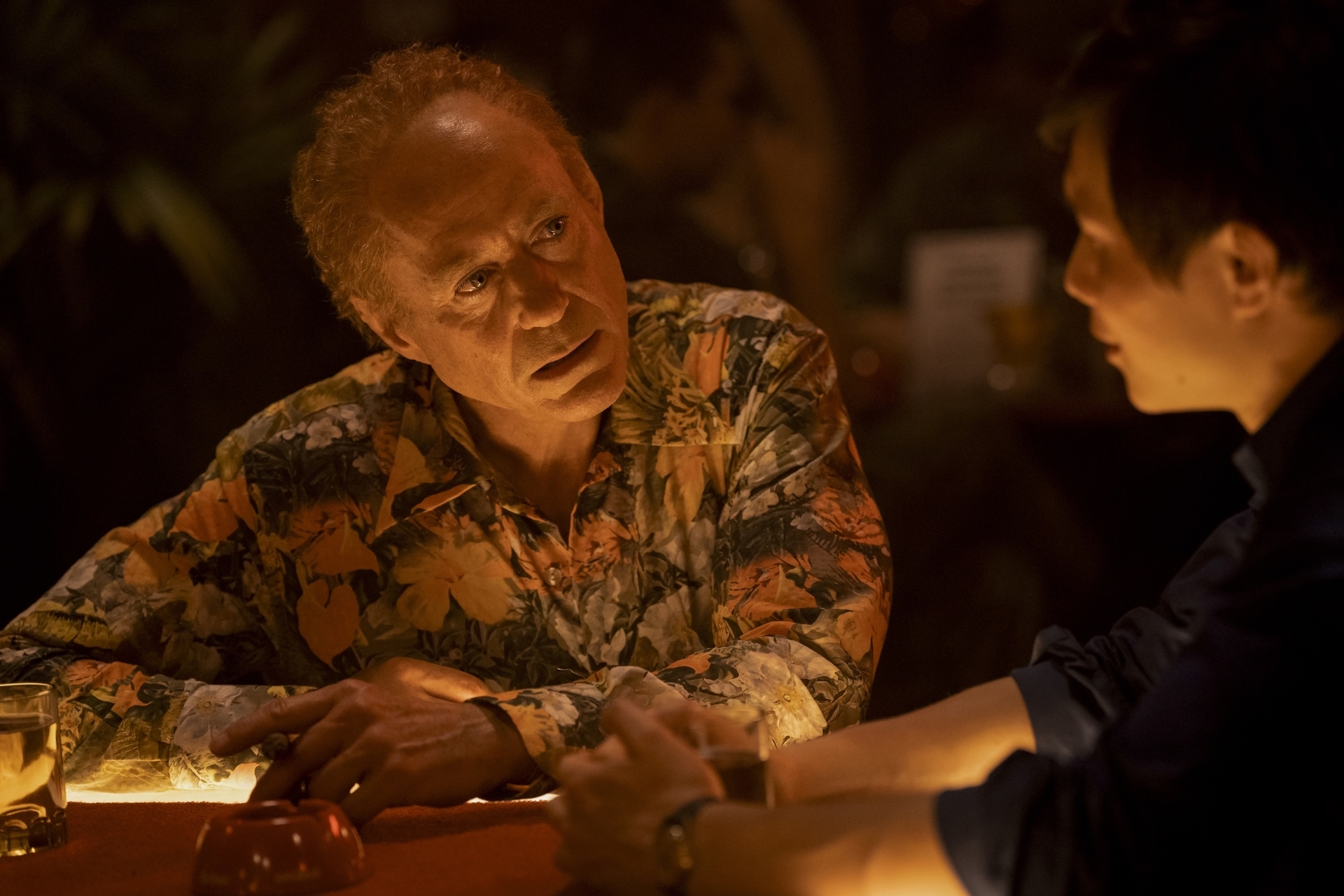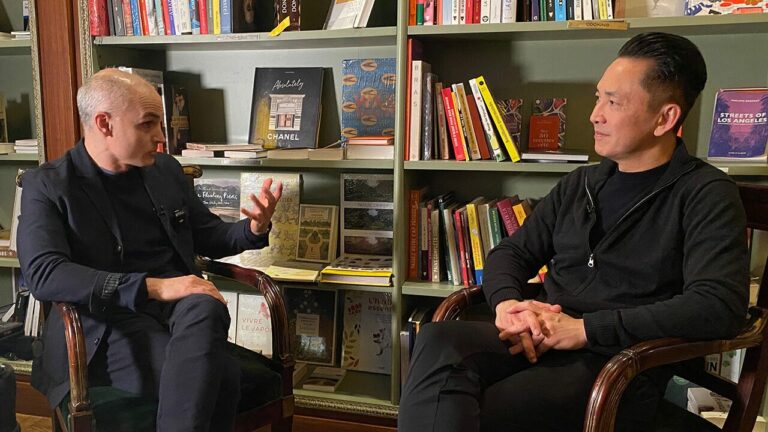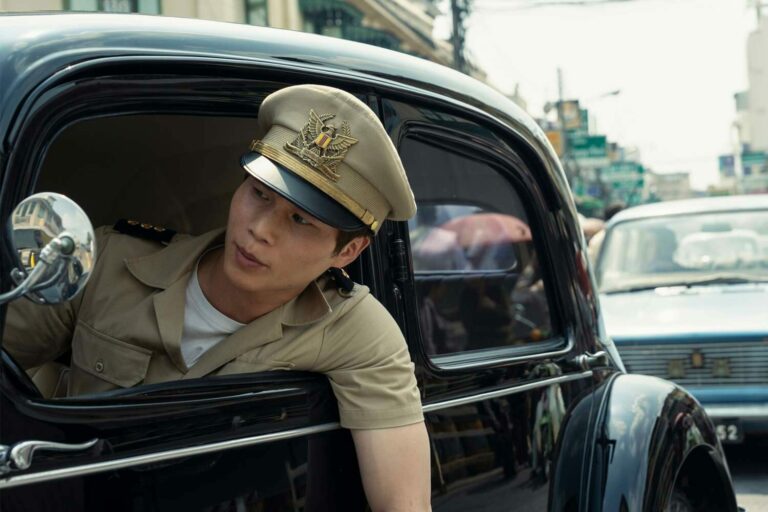Andrew R. Chow writes about Viet Thanh Nguyen and how his novel and forthcoming HBO series, The Sympathizer, pushes back against the hegemonic Hollywood narratives of the Vietnam War for TIME Magazine

When the author Viet Thanh Nguyen was growing up in California as a refugee from the Vietnam War, depictions of that conflict were omnipresent in American culture. Platoon, Apocalypse Now, Full Metal Jacket, and many other films portrayed American heroes fighting their way through a dystopian backwater and then dealing with the psychic toll of defeat back home. Very few of those films gave much thought to the experiences of the Vietnamese—who themselves refer to the conflict as the American War.
It’s been 51 years since the last American combat troops departed Vietnam. Nguyen now teaches a class on the war at the University of Southern California, and finds that most of his students—who were born after 2000—haven’t seen those movies. But their perspective and themes linger in the air, irrevocably molding the collective memory. “Hollywood has so radically shaped the global understanding of this war and its aftermath,” Nguyen says.
Nguyen offered a counternarrative with The Sympathizer, his Pulitzer Prize-winning 2015 novel that follows a North Vietnamese spy during and after the war. Now, that book is getting the Hollywood treatment, a miniseries adaptation premiering on HBO on April 14. The A24 production features a mix of big stars, including Robert Downey Jr., Sandra Oh, and John Cho, and ethnically Vietnamese newcomers, most notably Hoa Xuande in the lead role. Nguyen, who is an executive producer, and the creative team hope the series will force viewers to center the Vietnamese perspective of the conflict while rethinking fundamental American myths, including about how the country still wields its geopolitical power in a fractured world today. “Everything that the United States was doing in 1975 are things that are still happening now,” Nguyen says.
The Sympathizer tells the story of a half-Vietnamese, half-French communist agent who infiltrates the South Vietnamese military and then embeds in California after the war, hoping to sniff out gestating plots upon his homeland. The novel could hardly have been better received: it won the Pulitzer for fiction and landed on over 30 best-of-2015 lists for its biting wit and ambitious shifts in tone, from thriller to screenplay to satire. But Nguyen, now 53, harbored even grander dreams for his debut novel. “A successful novel might sell tens or hundreds of thousands of copies. But even a bad television series or bad movie would reach millions of people,” he says.
Hollywood didn’t immediately understand his vision. Nguyen says that in early meetings, producers were uneasy about his insistence that the show center Vietnamese people speaking Vietnamese. But the tone shifted following the political unrest during the Trump era, and the murders of George Floyd in 2020 and of six Asian American women in Atlanta in 2021. “Hollywood’s liberalism was challenged,” Nguyen says. “It took a while for the people with the capacity to make this kind of thing to catch up.”

Nguyen was thrilled by Park’s involvement, as The Sympathizer was inspired by Oldboy in its darkly funny exploration of violence, memory, and revenge. Park, in turn, recognized a kindred spirit. “The way he went about using humor in such an absurd and dire situation, that was very my style,” Park says through a translator.
Nguyen displayed his dark humor one day on set, during the filming of a movie-within-a-movie that skewers Hollywood’s one-dimensional depictions of the war. Nguyen asked to be cast as a nameless Vietnamese villager who gets blown up by the inner movie’s American heroes, as a symbol for how casually Hollywood treated mangled Asian bodies. “I just thought it would be appropriate for the author to be killed,” Nguyen told me, wryly. Instead, he was inserted into the show as a photographer at a party.
The adaptation is fairly faithful to the novel. Park and co-showrunner Don McKellar punched up the spy elements, making Xuande’s protagonist, referred to only as the Captain, into more of a noir action hero. That tweak meant that while the character is by no means an angel, he is slightly less brutal than in the novel. A scene in which he wields homophobic tactics to force a confession was altered, for example. “If you make him like Steve McQueen, he’s going to be very charming and sexy,” McKellar says. “It wasn’t to soften him. It just felt natural that in the visual medium, we had to lean into the movie-star appeal more.”

Another key decision that Park made was to have several of the white American characters—a Congressman, a filmmaker, a professor, a CIA agent—be played by one single actor. Park hoped to drive home a conceit central to The Sympathizer: that imperialist systems of power are entwined and overlapping. Park’s top choice was Robert Downey Jr., who agreed to take on the multifaceted challenge and serve as an executive producer with his wife Susan Downey, under the banner of their production company Team Downey. Downey Jr.’s presence also adds a meta layer of meaning. Many viewers, especially younger ones, know him best as Iron Man, whom Marvel’s Stan Lee envisioned as the “quintessential capitalist”: a billionaire fighting communism and supplying arms to the U.S. military. Iron Man was first introduced in a 1963 comic, fighting in Vietnam alongside Americans against the racist caricature Wong-Chu, the “red guerrilla tyrant.”
But Nguyen and Park make clear that The Sympathizer is neither pro-North Vietnam nor anti-America. Some of the novel’s searing condemnations are aimed at the Vietnamese government, which led to roadblocks in getting the book published in the country, Nguyen says. McKellar says they tried hard to film in Vietnam—sending hundreds of letters to the censor board—but did not get permission. (They ended up using Thailand as a substitute.) “I expect that [the Vietnamese government] will be pretty unhappy,” McKellar says.
While The Sympathizer spares no faction from criticism, both the book and series also harbor overt ideological aims. Nguyen is something of a progressive firebrand on social media and in public speaking appearances, and doesn’t hide his political goals for the show. Chief among these is challenging audiences to reckon with the corrosive global effects of American power and racism. “There’s a general allergy to this idea that literature or art can have any didactic or political function,” he says. “I think that’s wrong.”
Nguyen hopes the show will reveal the war’s place in American history and its relevance to conflicts still unfolding today. “Americans want to understand their wars as discrete things,” Nguyen says. “But if we’re talking about these wars in Asia, what we’re really talking about is an extension of America’s campaign from its very earliest settlement to continue expanding westwards, all the way to China. It’s all part of the same history.”
That history, Nguyen argues, extends to the U.S.’s support of Israel’s prolonged assault on Gaza. In October, a week after Hamas’ attack on Israel, Nguyen signed a letter criticizing Israel’s retaliatory attack on Gaza. The Manhattan venue 92NY pulled Nguyen from a book talk promoting his memoir, A Man of Two Faces. Nguyen says that despite potential repercussions, he was inspired by Martin Luther King Jr., who stumped against the Vietnam War and its “deadly Western arrogance” in 1967. Nguyen penned a foreword to a reprint of that speech this year. “Here was a man who extended his principles from the cause of Black liberation to the cause of being against American imperialism and what he saw as a racist war in Asia and in Vietnam,” Nguyen says. “I see Israel’s war on Gaza as an opportunity in the same way for moral and political clarity.”
Nguyen risks drawing the ire of right-wing ideologues—who might dismiss The Sympathizer as the epitome of a liberal Hollywood indoctrination campaign—and of Hollywood itself, which promised greater representation and creative freedom after 2020 but has become increasingly cautious in a moment of corporate consolidation. “I think the show is quite provocative in ways that are pretty unusual in American popular culture,” says McKellar. “I keep wondering if HBO understands exactly the land mines that they’re walking through here.”
First and foremost, The Sympathizer aims to succeed as a work of art: to thrill via its haphazard assassination attempts, clandestine romances, and games of cat-and-mouse. But Nguyen also hopes it stirs uncomfortable introspection and helps shift long-standing narratives. “It’s gonna be unsettling,” he says. “But it’s worth the risk if it could be a lever to affect the mass understanding of the war and its impact on Vietnamese people.”


